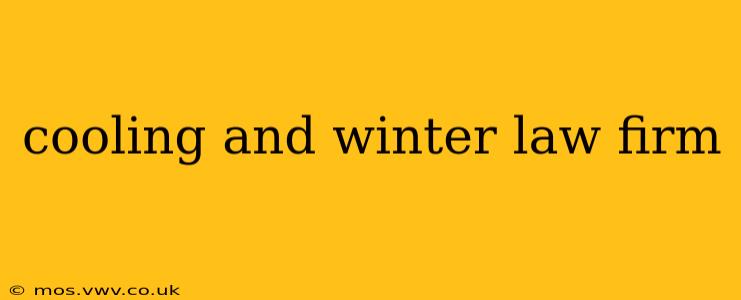Winter's chill isn't just uncomfortable; it can significantly impact a law firm's bottom line. High heating bills and potential equipment malfunctions are just the tip of the iceberg. This comprehensive guide explores the multifaceted challenges law firms face during winter and provides practical strategies for mitigating costs and maintaining a comfortable, productive workspace. We'll delve into energy efficiency, preventative maintenance, and even the unexpected legal ramifications of winter weather.
How Can I Reduce My Law Firm's Energy Costs in Winter?
Reducing energy costs is a crucial aspect of winter preparedness for any business, and law firms are no exception. Implementing energy-efficient practices can lead to substantial savings over the long term. This includes:
- Investing in Smart Thermostats: Programmable or smart thermostats allow for precise temperature control, automatically adjusting the heating based on occupancy and pre-set schedules. This minimizes energy waste when the office is unoccupied.
- Regular HVAC Maintenance: Preventative maintenance is key. Scheduling regular check-ups and cleaning of HVAC systems ensures optimal efficiency and prevents costly repairs down the line. A well-maintained system operates more efficiently, reducing energy consumption.
- Improving Insulation: Proper insulation in walls, ceilings, and windows significantly reduces heat loss, keeping the office warmer with less energy expenditure. Consider upgrades to window seals or additional insulation if needed.
- Switching to LED Lighting: LED lighting consumes significantly less energy than traditional incandescent or fluorescent bulbs, contributing to lower energy bills and a more environmentally friendly workspace.
- Utilizing Natural Light: Maximize natural light sources during daylight hours by opening blinds and curtains. This reduces reliance on artificial lighting and helps lower energy consumption.
What are Some Common Winter-Related Problems Law Firms Face?
Winter presents a unique set of challenges for law firms, ranging from operational disruptions to potential legal liabilities. Some common issues include:
- Power Outages: Winter storms can cause power outages, disrupting operations and potentially leading to lost productivity. Having a backup power generator or plan is crucial for minimizing downtime.
- Heating System Malfunctions: Extreme cold can strain heating systems, leading to malfunctions or complete failures. Regular maintenance, as mentioned above, is critical for preventing such issues.
- Water Damage from Frozen Pipes: Frozen and burst pipes can cause significant water damage, requiring costly repairs and potential business interruption. Taking preventative measures, such as insulating pipes and keeping the thermostat at a minimum temperature, is essential.
- Slip and Fall Accidents: Snow and ice can create hazardous conditions outside and inside the office building. Proactive snow removal and the use of salt or ice melt are crucial for preventing slip and fall accidents and related legal liabilities.
How Can My Law Firm Prepare for Winter Weather Events?
Proactive preparation is key to mitigating the risks associated with winter weather. A comprehensive plan should include:
- Emergency Contact List: Establish a readily accessible list of emergency contacts, including employees, vendors, and service providers.
- Communication Plan: Develop a communication plan to keep employees informed during winter weather events, including potential closures or delays.
- Backup Power Source: Invest in a backup power generator or explore alternative power solutions to ensure business continuity during power outages.
- Snow Removal Plan: Establish a plan for snow removal, outlining responsibilities and ensuring timely action to maintain safe access to the office.
- Disaster Recovery Plan: Develop a detailed disaster recovery plan to outline procedures for responding to and recovering from winter-related emergencies.
What are the Legal Ramifications of Winter Weather on a Law Firm?
Winter weather events can trigger various legal implications for law firms. These include:
- Liability for Slip and Fall Accidents: Law firms can be held liable for slip and fall accidents on their premises if they fail to maintain safe conditions. Adequate snow removal and ice melt are crucial for mitigating this risk.
- Breach of Contract Due to Delays: Winter storms can cause delays in project completion or client meetings, potentially leading to breach of contract claims. Careful contract drafting and clear communication can help mitigate this risk.
- Employee Safety Concerns: Law firms have a legal obligation to provide a safe working environment for their employees. Failing to address winter weather hazards can lead to legal action.
By proactively addressing the challenges of winter and implementing effective strategies, law firms can minimize disruptions, reduce costs, and ensure a safe and productive work environment. Remember that preventative measures are far more cost-effective than reactive repairs. A well-prepared law firm is a resilient law firm, ready to face whatever winter throws its way.
